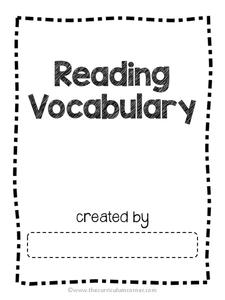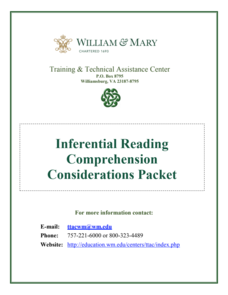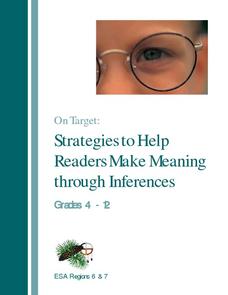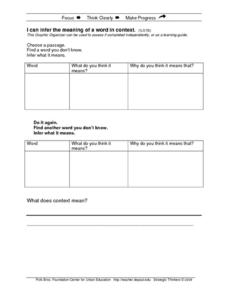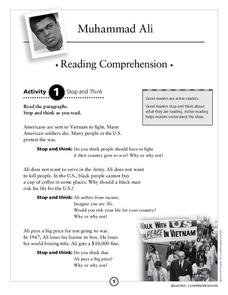Pearson
Making Inferences
The ability to make inferences is an important skill. Provide your class with some practice. This resource includes several different passages with which learners are required to practice inferring. They read each passage and respond to...
Curated OER
Mini-Lesson Planning for Inferences
Making inferences and drawing conclusions is a key component to successful active reading. Encourage your class to use context clues and prior knowledge to infer different elements of a story, including the setting, plot, and character...
K12 Reader
What Do You See? (Inferences)
Making inferences is a skill that goes beyond the comprehension of written text. In this simple exercise, young learners are provided with a photograph and asked to answer a series of inference questions using only on the information...
Curriculum Corner
Academic Reading Vocabulary
From A to Z, learners define, draw, and find examples of specific reading focus skills in an alphabetized reading vocabulary packet. Words include dialogue, theme, text structure, genre, paraphrase, and many more.
City College of San Francisco
Making Inferences: Reading Between the Lines
Have you ever read part of a story and had to figure out what the rest was about? Practice making inferences with several short passages and multiple choice questions.
Bethel School District
Observations and Inference
What's the difference between qualitative and quantitative observations? Learners make observations, inferences, and predictions about their environment with a set of questions and activities that are applicable to either language arts...
Polk Bros Foundation
Comprehensive Nonfiction Reading Questions
Analyze any nonfiction text with the set of questions on this sheet. Class members practice inferring by noting the main idea and purpose of a passage. They also analyze an opinion in the passage and write a brief summary. See the...
Mr. Nussbaum
Abraham Lincoln Reading Comprehension—The Presidential Years (Part 4)
How do you bring a nation back together after there is civil war? Readers learn how the United States Civil War concluded with a passage focused on the latter part of Abraham Lincoln's presidency. Multiple choice questions check pupils'...
Curated OER
Express Yourself Lesson Seed 6 Close Reading
Look back at the third chapter of The Cay with your class. Pupils will conduct a close reading, taking a second look at a chunk of text and responding to a series of text-dependent questions. Wrap up with an analytical writing prompt...
William & Mary
Inferential Reading Comprehension Considerations Packet
Don't forget to read between the lines! Educators learn tips and activities to help scholars learn to infer to increase reading comprehension. Activities suggested include think alouds, backwards words, and who's who. the packet includes...
Curated OER
On Target: Strategies to Help Readers Make Meaning through Inferences
Here's a resource that explicitly teaches, models, and provides readers with opportunities to practice the process of drawing inferences from text. Packed with strategies elementary, middle, and high school teachers can use, the resource...
Crafting Freedom
Harriet Jabocs and Elizabeth Keckly: The Material and Emotional Realities of Childhood in Slavery
Learning how to make accurate inferences by putting together facts found in multiple sources is one of those skills all learners must develop, but one that can be a challenge to teach. This resource is a must-have for your curriculum...
K12 Reader
Inference Practice: Where Am I?
Have your pupils try a hand at making inferences. The worksheet includes five different descriptions, and learners must infer where they think the passage is happening and provide some explanation. A straightforward resource for...
Polk Bros Foundation
I Can Infer the Meaning of a Word in Context
Work on developing strategies for determining the meaning of unknown words and phrases with a quick context clues exercise. Class members choose two words from their reading and write down what they think they mean and why. See the...
Polk Bros Foundation
I Can Infer the Main Idea When I Read
While reading any text, ask your pupils to keep this graphic organizer on hand. They can note down the main idea and three supporting details during or after reading. The instructions allow for individuals to use words or images to...
K12 Reader
Visual Clues
Whether you realize it or not, reading an image and reading a text require similar skills, including the ability to make inferences. For this simple worksheet, children look at a picture of a snowy winter day and answer a series of...
K12 Reader
What Happens Next?
While your students may not be psychics, that doesn't mean they can't predict what will happen next in a story. To hone this important reading comprehension skill, young learners read a series of three short passages before writing a...
EngageNY
Reading Closely to Build Background Knowledge: “Myths and Legends”
That is a myth! Scholars take a look at Greek myths referenced in The Lightning Thief. As learners listen to stories in Myths and Legends, they imagine the sights and sounds described. Pupils then talk with partners about specific words...
National Endowment for the Humanities
Harriet Jacobs and Elizabeth Keckly: The Material and Emotional Realities of Childhood in Slavery
Young historians learn how to make generalizations based on primary sources in a instructional activity that uses the autobiographies of two women born into slavery. The class watches a historical re-enactment of scenes from the lives of...
Polk Bros Foundation
Common Core Constructed Response Organizer
Get your writers ready to compose a constructed response essay in response to either an informational or fictional text. Pupils note down the big idea they wish to address as well as up to nine examples from the text that they wish to...
Library of Congress
Muhammad Ali
Muhammad Ali was the greatest, as he'd tell you himself. A set of reading comprehension worksheets walks through parts of Ali's life and promotes individuals to become good readers and writers.
Curated OER
"I Can” Common Core! 6th Grade Reading
It is much easier for kids to know they have reached a goal when that goal is clearly defined. By providing sixth graders with a checklist of Common Core reading standards written in "I can" format, each child can keep track of his own...
Polk Bros Foundation
I Can Locate and Classify Information About a Topic
After reading a text, ask your pupils to recall and organize what they've just learned into a blank three-column chart. Class members write the topic and fill in the columns with information. The sheet also prompts students to write a...
National Park Service
A Tale of Two Men
Theodore Roosevelt and the Marquis de Mores were both born in 1858, and both came to the Dakota territory in 1883, but they influenced the developing country of America in different ways. Elementary and middle schoolers apply written and...





